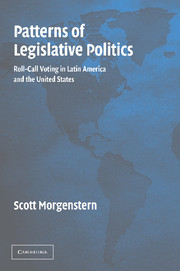Book contents
- Frontmatter
- Contents
- Tables and Figures
- Preface and Acknowledgments
- Party, Faction, and Coalition Names and Abbreviations
- 1 Patterns of Legislative Politics: Identifiability and Flexibility
- 2 Representation and the Agent System
- 3 Identifying Agents
- 4 Influences on Agent Unity: Discipline and Cohesion
- 5 Explaining Voting Unity
- 6 Policy Coalitions and Agent Flexibility
- 7 Conclusion
- Bibliography
- Subject Index
- Author Index
6 - Policy Coalitions and Agent Flexibility
Published online by Cambridge University Press: 24 July 2009
- Frontmatter
- Contents
- Tables and Figures
- Preface and Acknowledgments
- Party, Faction, and Coalition Names and Abbreviations
- 1 Patterns of Legislative Politics: Identifiability and Flexibility
- 2 Representation and the Agent System
- 3 Identifying Agents
- 4 Influences on Agent Unity: Discipline and Cohesion
- 5 Explaining Voting Unity
- 6 Policy Coalitions and Agent Flexibility
- 7 Conclusion
- Bibliography
- Subject Index
- Author Index
Summary
In addition to the patterns of unity among agents, legislative politics is defined by the grouping of the agents into majorities for the passage of legislation. Describing these patterns implies a focus on “coalitions,” but because presidents do not rely on the confidence of the agents in their cabinet to remain in office, coalitions in presidential systems do not generally take the solid form that they do in countries with parliamentary rule.
Coalition politics, nevertheless, have been central to the histories of much of Latin America (Foweraker, 1998). Deheza (1997) found that more than half of all governments formed in postwar Latin America have included more than a single party and, much like parliamentary systems, there have been multiple examples of governments forming from minimum-winning, supermajority, temporary, and durable coalitions. She concludes, importantly, that these coalitions have helped presidents generate the necessary support to implement their policies. Analyses focused on Argentina, Brazil, and Chile have reached similar conclusions (Figueiredo and Limongi, 2000; Mustapic, 2002; Siavelis, 2002).
In spite of their importance, the definition of presidential coalitions is not yet clear, and a first task of this chapter is to clarify the different meanings of this term. Then, with a focus on “policy coalitions,” the chapter demonstrates empirically the proclivity of different legislators and agents to join with one another on roll calls. These two indicators suggest that unlike the polarized 1960s and 1970s, agents have been relatively flexible in the 1990s – except in the United States.
- Type
- Chapter
- Information
- Patterns of Legislative PoliticsRoll-Call Voting in Latin America and the United States, pp. 139 - 187Publisher: Cambridge University PressPrint publication year: 2003



